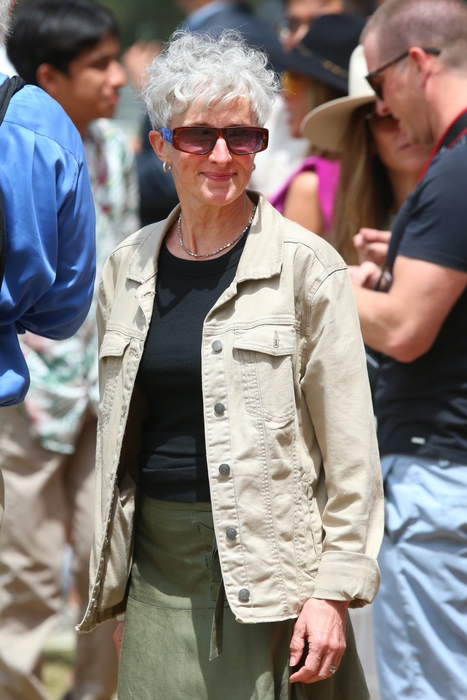Teen Cancer America held a successful polo fundraiser at Will Rogers Historic State Park on June 10. It was an amazing event, not only raising funds but awareness.
A teen or young adult cancer diagnosis differs from an older individual and may not even be initially considered.
Betty Roggenkamp who switched from a career in architecture to work in the field of cancer care, serves as AYA (adolescents and young adults) program development strategist for Teen Cancer America.
When her sister was diagnosed with cervical cancer, Roggenkamp said, “I saw so much need beyond the treatment of the disease that wasn’t being met.”
Her sister said, “you have to do something about this.”
“So I am,” Roggenkamp said.
Her sister was in her 50s when diagnosed and did not survive.
Roggenkamp’s nephew was diagnosed with cholangiocarcinoma at age 41. He also did not survive.
“So many people who work in the AYA space are AYA themselves or have a close cancer experience, Roggenkamp said. “It makes us experts of a different level.”

Betty Roggenkamp, who works as a development strategist for Teen Cancer America, was at Will Rogers Park.
Photo: Rich Schmitt/CTN
About 86,000 AYA (those 15 to 39 years of age) are diagnosed every year with cancer. According to the American Cancer Society, some of the most common cancers in your adults are breast cancer, Lymphomas (non-Hodgkin and Hodgkin), melanoma, sarcomas (cancers of connective tissues like muscles and bones), cancers of the female genital tract (cervix and ovary), thyroid cancer. testicular cancer, colorectal cancer and brain and spinal cord tumors.
Roggenkamp calls the AYA group “Under recognized and underserved.”
It has only been recently that this age group, diagnosis and treatment, was formally acknowledged, because cancer more often occurs in older adults. When a youth was sick, cancer was not always the first disease considered.
In 2006, the National Cancer Institute held a first progress review group to develop recommendations.
And because doctors don’t always recognize the initial symptoms as cancer, young adults are “often are diagnosed with later-stage disease because cancer is not typically thought to be an option.”
Since there is no hospital specifically for this age group, those teens with cancer may be put in pediatric hospital or even if they are much younger, may be put in an adult setting.
Research is also limited for this age group, because clinical trials may prohibit AYAs from enrolling – or there is not a large enough pool to study. “Their disease biology can be different from older or younger people,” Roggenkamp said.
For these young adults, Roggenkamp said a cancer diagnosis raises additional problems “psychosocial issues (with social media, they see their peers moving on through life having the milestones that will be delayed, or never happen, such as fertility loss), PTSD, cancer recurrence, second cancers due to the treatment, financial issues and cognitive effects.”
Cancer and the treatment may affect a person’s ability to have biological children. “AYAs may not be provided information regarding how the cancer or the treatment may affect their fertility,” she said. “And when they are, preserving a patient’s fertility is often not covered by insurance and is cost prohibitive.”
She said that there is a near 86% survival rate for AYA, but that cancer interrupts the important life stages of becoming an independent adult, and the effects could be for life.
Part of Teen Cancer American’s vision is to help health care facilities develop age-specific programs that restructure the health system to best support this currently underserved population.
This age group is not established financially, might be in the middle of an education or in the initial stages of raising a family.
“Cancer and its treatment are complicated, costly, and cause chaos in the life of the person with it, and for those who care for them,” Roggenkamp said.
After making the career switch, she chose working with this age group because “I found the clinicians and researchers to be more creative in how they approached care and willing to learn and share.”
Teen Cancer America has formed two different national collaborative groups of clinicians and allied health professionals that meet monthly to discuss and share research and care practices.
“I had experience running collaboratives of clinicians in the Chicago-land area and developed a focus on AYA quality improvement,” Roggenkamp said. “Working with TCA was an ideal place for me to land so we could work together developing AYA programs across the country.
Roggenkamp said the Polo fundraiser at Will Rogers State Park was important because it raised awareness. “It builds a supportive community, where young people diagnosis with cancer feel heard and understood.”
With adult cancer types on the rise in this population, Roggenkamp said events such as this raise much needed funds, so “We at Teen Cancer America can work with even more cancer treatments sites across the United States to help develop AYA programs and spaces that span both adult and pediatric oncology addressing the needs of a young person.”
“TCA has made great strides in the US and around the world to bring attention and focused care to this underserved population of young people who have a cancer diagnosis,” Roggenkamp said. “TCA has a goal to do much, much more!” (Visit: teencanceramerica.org)


